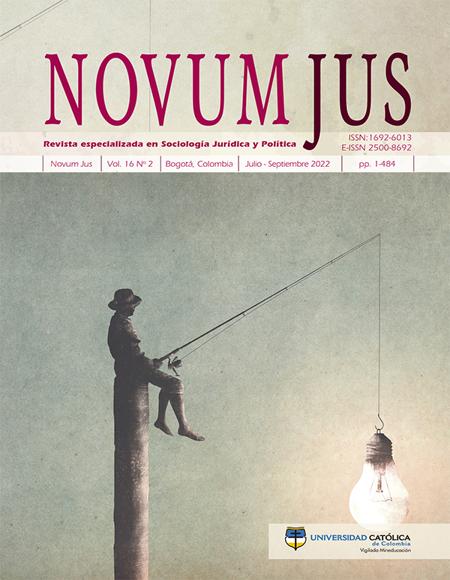
Este trabalho está licenciado sob uma licença Creative Commons Attribution-NonCommercial 4.0 International License.
Aquellos autores/as que tengan publicaciones con esta revista, aceptan los términos siguientes:
- Los autores/as conservarán sus derechos de autor y garantizarán a la revista el derecho de primera publicación de su obra, el cuál estará simultáneamente sujeto a la Licencia de reconocimiento no comercial de Creative Commons que permite a terceros compartir la obra siempre que se indique su autor y su primera publicación esta revista.
- Los autores/as podrán adoptar otros acuerdos de licencia no exclusiva de distribución de la versión de la obra publicada (p. ej.: depositarla en un archivo telemático institucional o publicarla en un volumen monográfico) siempre que se indique la publicación inicial en esta revista.
- Se permite y recomienda a los autores/as difundir su obra a través de Internet (p. ej.: en archivos telemáticos institucionales o en su página web) antes y durante el proceso de envío, lo cual puede producir intercambios interesantes y aumentar las citas de la obra publicada. (Véase El efecto del acceso abierto).
Resumo
Respeitar e proteger a todas as partes sempre foi o objetivo de todo o processo penal, o qual busca que a justiça seja feita em todas as fases do julgamento. Essa proteção é de maior importância ao se tratar de vítimas que vêm sofrendo danos como consequência de delitos. Por essa razão, tanto a Índia quanto a Ucrânia têm dado proteção especial aos direitos das vítimas ao longo do processo penal. Este artigo tem como objetivo analisar o papel e grau de proteção que esses códigos de procedimento penal oferecem a respeito dos direitos das vítimas. Apesar dos ordenamentos estabelecidos, a condição da vítima continua sendo questionável, afetando consideravelmente a credibilidade dos códigos de procedimento penal desses países. Para determinar se realmente garantem o respeito dos direitos das vítimas, foi utilizada uma metodologia comparativa, a fim de estabelecer as expectativas dos dois sistemas de direito penal nessa matéria. Os resultados sugerem que, embora os códigos de procedimento penal de ambos os países contem com disposições relevantes para proteger os direitos das vítimas, na realidade seus sistemas processuais penais continuam padecendo de problemas nesse aspecto. Em consequência, é necessário conferir esses códigos para garantir o respeito dos direitos das partes, especialmente os das vítimas.
Palavras-chave

Referências
Ablamskyi, Serhii, Hennadii Hlobenko, Ruslan Chycha, Olena Martovytska, and Iryna Burlaka. “Ensuring Protection of the Rights of the Aggrieved Person in Criminal Proceedings through the Prism of Requirements of International Law Acts.” Journal of Legal, Ethical and Regulatory Issues, 23, Special Issue (2020): 1-7. https://www. abacademies.org/articles/Ensuring-protection-of-the-rights-of-the-aggrievedperson-1544-0044-25-SI-540.pdf.
Criminal Procedure Code of Ukraine of 13.04.2012 № 4651-VI. https://zakon.rada.gov.ua/laws/show/4651-17#Text.
Fedorchuk, N. B. “Restorative proceedings as an alternative to criminal: an overview of it in the UK and other countries of the case law system.” Bulletin of Lviv University. The series: legal, 42 (2006): 360-65.
Globenko, G. I. “On the issue of reimbursement (compensation of the caused harm to the victim in the criminal procedure of Ukraine.” Law and Safety, 65, n.° 2 (2018): 71-75. http://pb.univd.edu.ua/index.php/PB/article/view/81
O’Connell, Michael. “Victims’ Rights: Integrating victims in criminal proceedings.” https://aija.org.au/wp-content/uploads/2017/08/OConnell2.pdf
Peachey, Paul. “Two-tier justice: Private prosecution revolution.” The Independent, 16 August 2014.
“Practice of application by courts of the legislation which provides the victim’s rights of crimes [generalization]: the letter of the Supreme Court of Ukraine from January 1, 2005.” Bulletin of the Supreme Court of Ukraine, n.° 1 (2005): 25-31.
Prosecutor General’s Office of Ukraine. Statistical Information for the period 2015-2021. https://gp.gov.ua/ua/posts/pro-zareyestrovani-kriminalni-pravoporushennya-ta-rezultati-yih-dosudovogo rozsliduvannya-2.
Prysiazhniuk, T. I. Victim of crime: problems of legal protection. Kyiv: Educational Literature Center, 2007.
Resolution of the Second Judicial Chamber of the Criminal Court of Cassation of the Supreme Court of 30.04.2020 (Case № 640/19897/16-к). https://zakon.cc/court/document/read/89034985_941cc39b.
Strokov, I. V. “Organizational and legal measures to ensure the rights of victims of crime.” Scientific Bulletin of the National Academy of Internal Affairs of Ukraine, 1 (2004): 81.
Tyschenko, O. and I. Titko. “Guaranteeing victim’s rights at the pretrial investigation stage.”Bulletin of the National Academy of the Prosecutor’s Office of Ukraine, 1 (2012): 61.
Unified State Register of Judgments. Resolution of the Board of Judges of the Third Judicial Chamber of the Criminal Court of Cassation of the Supreme Court of 07.08.2019 (Case № 607/14707/17). http://www.reyestr.court.gov.ua/Review/83589933.
United Nations. Declaration of Basic Principles of Justice for Victims of Crime and Abuse of Power, UN Doc A/RES/40/34. 1985.
Yukhno, O. O. “Problematic Issues of Guaranteeing Property and Personal Non-Property Rights of Victims within Criminal Proceedings.” Law and Safety, 80, n.° 1 (2021): 180-87. https://doi.org/10.32631/pb.2021.1.25





















